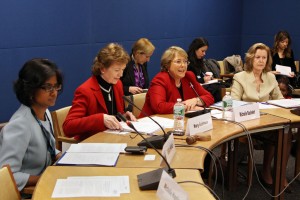Equality, Empowerment and Energy: A Dialogue Between Women Leaders and Grassroots Women
Date:
A meeting on the emerging issues of gender equality and sustainable development brought together women leaders with diverse grassroots women and organizations at the United Nations.
Held during the UN 56th Commission on the Status of Women in New York, the event was an opportunity for rural women's organizations to share their experiences and priorities - particularly those concerning access to energy - with committed high-level women leaders known as the Troika Plus. The key messages from the event will be taken forward by the women leaders, to the UN Conference on Sustainable Development (Rio+20) in June, where they will inform and shape the discussions.

Convening the roundtable were Michelle Bachelet, Under-Secretary-General and Executive Director of UN Women, and Mary Robinson, President of the Mary Robinson Foundation for Climate Justice. “Access to and control over clean energy sources are central to unleashing the potential of women and girls, said Ms. Bachelet. “As primary users of household energy for cooking and heating, rural women are best placed to determine what their energy needs are and how they can best be addressed.
At the event, civil society representatives stressed the critical need to build on women's skills and experience in order for clean energy projects to take root and thrive. They highlighted success stories on the ground, such as a market-based initiative in Sub-Saharan Africa by Solar Sister, an organization that has trained 160 women to operate and sell low-cost solar energy lamps, and is now working to expand the network to 5, 000 members.
Many speakers also stressed the need for energy projects to take a comprehensive approach, including enhancing women's economic opportunities, and helping them access decision-making processes— in parliaments to planning commissions—so that energy is delivered where and how they need it. Policies can incentivize sustainable energy and, at the same time, advance development objectives. In enacting strategic tax waivers for example, as the participants highlighted, parliaments have the power to support clean energy sources while withdrawing subsidies on more inefficient or damaging fuel sources, such as kerosene, which is harmful to users' health.
Speaking about the roundtable, Ms. Robinson said: “This is a different kind of meeting. This Troika Plus of women have access to the table and decision-making at quite senior levels. We have an opportunity, and I think we should try and take that opportunity to make sure that the voices of women, especially rural women, are properly heard.
The positive impact of sustainable energy projects were also showcased at the meeting. Ms. Radhia Muthiah, a member of the Troika Plus and head of the UN Foundation-led Global Alliance for Clean Cookstoves, outlined its mission to have 100 million households using clean, safe energy cookers by 2020, as a way to save lives, improve livelihoods, empower women, and reduce climate change emissions.
The perspectives of grassroots women on clean energy and sustainability will be taken by the women leaders — including Ms. Robinson, Ms. Bachelet, Ms. Muthiah and others, to Rio+20. This includes UN Women's Women Leaders Forum, a full-day symposium that will highlight the voices and participation of diverse women, including grassroots women.
Meanwhile, UN Women, with the Rockefeller Foundation, is also supporting the Women's Major Group at Rio +20 —a coalition of women's civil society organizations— by conducting a global survey on sustainable development. This will gather the views, perspectives and goals of advocates around the world on the issue of gender equality and women's empowerment, and use them to provide input to the Rio+20 processes. To complete the survey, go to: www.surveymonkey.com/s/Rio20_Gender